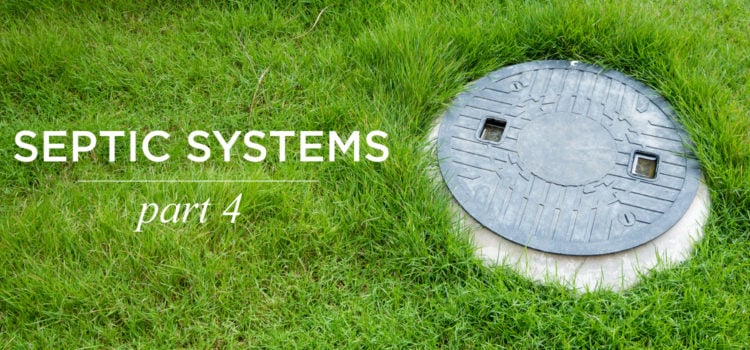The Final Flush
This is the 4th article in a 4-part series about private, on-site septic systems in residential settings. See Part 1 for an overview about construction, layout and overall understanding; Part 2 about getting an inspection as part of the purchase process, Part 3 to make sense of septic inspection discoveries.
By Deborah Rutter
There is something to be said for not having a sewer bill every month. Sure, it doesn’t usually break the bank, but being able to have your own land handle your own waste water? It’s not exactly thumbing a nose at the establishment, but one small way to be in control over a major household system!
Maintaining a septic system can be easy if you start early and keep up. Much like any system of a home, it’s all in the care, use, and regular maintenance. Here are some tips to keep everything running!
1) Only Three Things: Water, toilet paper, and human waste. That is all that should go down drains and toilets. No grease, ear swabs, dental floss, eyeliner shavings, paper towels, toys (yes, this can be hard for toddlers!) feminine hygiene products, and definitely no baby wipes! Even if the package says “flushable”—don’t flush them! The entire system works on bacteria breaking down debris in the tank. Anything beyond the acceptable three things can cause the system to shut down or clog up and stops the natural processes.

2) Be Picky About Toilet Paper: Use toilet paper marked “septic safe.” It makes a difference. Thinner is better. You want that paper to break down fast and completely.
3) No Garbage Disposal: Any good septic inspector will tell you to get rid of this if one is installed. No food scraps should be going down the sink. Even a disposal can’t break down the food waste enough. Instead, use a drain cover and dispose of food waste in the trash or compost bin.

4) Tell Your Friends! If you have friends and family come over to visit, be sure to let them know you are on a septic system. Many people are utterly clueless about what a septic system is and have no idea how to treat them properly. A small sign on the back of the toilet can be enough to prompt a conversation about care and use. Chances are, friends and family want to be helpful.
5) Get Regular Pumping and Inspections: Once you have had your purchase inspection, have the tank pump and the distribution box inspected every two-to-three years to get an assessment about how your treatment of the system is going. After that overview and recommendations, you will likely be cleared to pump every three-to-five years.
6) Mark Your Locations: Place some sort of marker or indicator for your tank and distribution box and be sure you know where your leach field is. You don’t want to plant trees, build raised beds, pour a concrete patio over these items (yes, I have seen all of these!). Having these marked is also helpful when you sell so that the inspection your buyers get is targeted without a lot of exploratory holes being dug searching for all the components!
7) Permit your Improvements! If you add square footage or people to your household, be sure your system can handle the extra pressure. Call the local health department and get an assessment. Any building permit you apply for may also have a requirement for an expanded system and usually extra drain lines in the leach field.

8) Plan for Issues: Not having a sewer bill every month is great, but that doesn’t mean it’s free. Maintenance costs money, as do replacements of aging components. Be sure you are financial planning for the unexpected as you would for other household systems and appliances.
Having an on-site septic system is one small way to get off the grid and save a bit of money on monthly charges. With a solid inspection to start and then regular maintenance, you can expect a new, well-installed and permitted system to last for decades!
Happy flushing!
